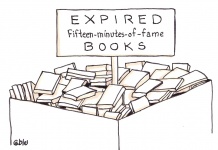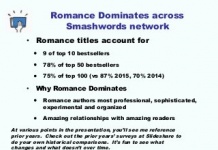 Two weeks ago, we covered the new Scribd/Smashwords partnership, and one of the things I noticed when I read the announcement was how complicated were the Scribd and Smashwords author compensation terms. I’ve already covered the first part of my interview with Andrew Weinstein, VP of Content Strategy at Scribd where he discussed piracy. When we finished that subject, I asked him about the compensation terms.
Two weeks ago, we covered the new Scribd/Smashwords partnership, and one of the things I noticed when I read the announcement was how complicated were the Scribd and Smashwords author compensation terms. I’ve already covered the first part of my interview with Andrew Weinstein, VP of Content Strategy at Scribd where he discussed piracy. When we finished that subject, I asked him about the compensation terms.
You may remember that while Smashwords authors receive payment from Oyster when a reader completes 10% of the book, it’s different for Scribd. The short version is that authors are paid in full when a reader completes 30% of a book. That’s a big difference, and I wanted to know why.
Here was his answer.
We thought it made sense to get paid as if the book had been purchased at retail. Readers get 10% of the book for free now as part of the retail store experience. We think our value proposition is such that 10% is not fair because reading that much of the book is not reading the entire book.
When do we think a person has really read a book? 30% is a commitment and we think it likely a reader would have purchased the book.
I could see the logic there. So what about the partial payment after a reader has read 20% of the book? That was a compromise between Scribd and Smashwords, who didn’t think only paying out after 30% was fair.
I had to laugh when he said the terms were easy from a user perspective. It’s not like a banner pops up when you get to 29% of the book: “Read More And Authors Get Paid In Full. Be Certain You Intend To Finish The Book!” He said he is careful when he does demos, however. When I was reading a book in Scribd on Christmas Day, I did catch myself being aware of that 30% point, but I doubt I’ll think about it for long.
Nothing that Weinstein said or implied questioned the arrangement with Oyster, but our conversation did leave me wondering. 10% is a tiny percentage of a book. Will Oyster be able to continue with that model? I agree that 30% is a commitment, while 10% is basically sampling. I’ll be curious to see if Oyster will need to readjust its terms sometime in the future.
And considering how I consume books in Scribd (11 last month), I have to hope they will be profitable with the subscription plan. As both author and reader, I’d like both services to continue for a long time.
Update: The original post made an inaccurate comparison between the Smashwords compensation structure and other publishers. I’ve deleted the sentence making the comparison.


































hi, juli,
i heard (read) somewhere that the partial reads could be spread out over more than one month, so someone reading x % one month, and enough the next mth, could trigger a full sale that way too
any news about that, that you know of ?
thanks, interesting posts!
adan
@Felipe, I suspect that is correct, but it didn’t come up in my discussion with them. I’m glad I’m not the one programming the system to keep track of the payments. I’ll be interested to see how it plays out over the coming months as people (hopefully) browse and read my books.
Thank you for dispelling some of the confusion, Juli. I’m the community manager at Scribd, and I know terms have been confusing from an authors’ perspective. This is really helpful for them!
@Carrie, you’re welcome. Thank you for commenting.